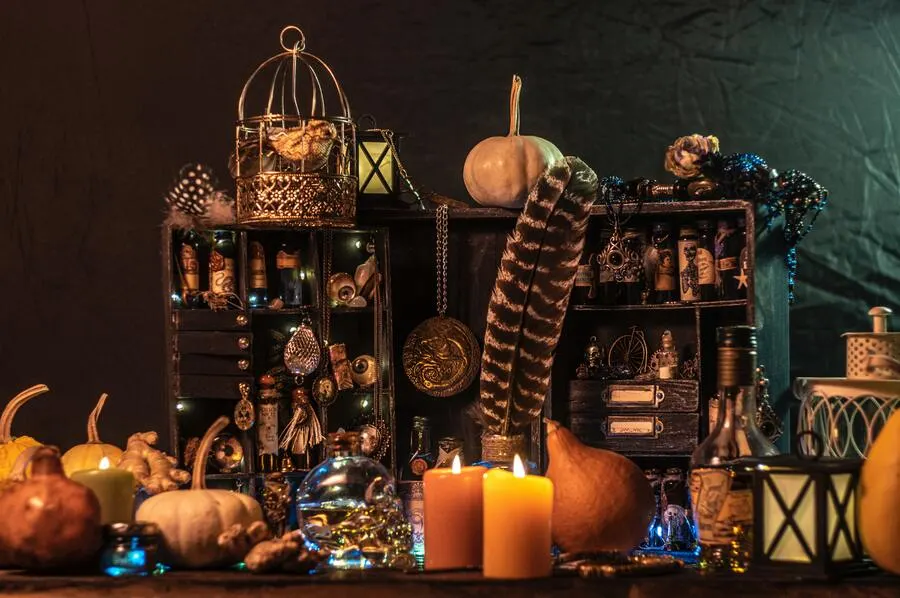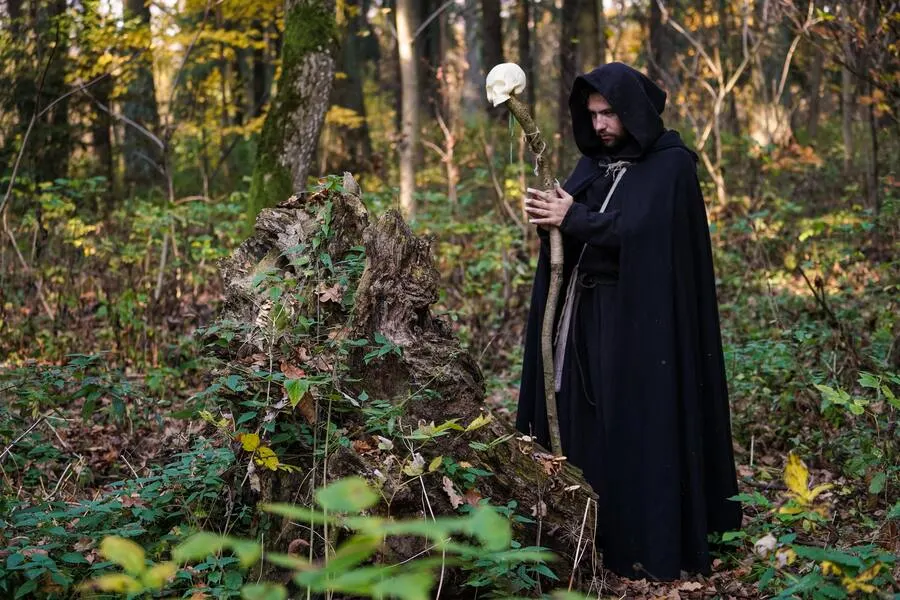In this article, I’ll be discussing these three fictional beings about their origins, and the main differences between the three. I hope that by the end of this article you have a clear understanding of what these three supernatural beings are and their differences.
So without further redo let’s get started.
What Is a Mage?
A mage is a person who is also known as an enchanter, magician, magic-user, sorceress, spell-caster, warlock, witch, or wizard.
Well, mages are the people that can learn magic, perform it and then teach other people. Although this makes them less powerful than a wizard, they still have better control over their spells.

Some Famous Fictional Mage
These are just some famous characters in movies and TV shows.
- Merlin
- Albus Dumbledore
- Gandalf
- Glinda the Good Witch
- Willow Rosenberg
- The White Witch
- Sauron
- Voldemort
Fantasy Magicians Books/Novels
Some of the famous books and novels:
- The Hobbit by J.R.R. Tolkien (1937).
- The Lion, the Witch, and the Wardrobe by C.S. Lewis (1950).
- A Wizard of Earthsea by Ursula K. Le Guin (1968).
- The Fellowship of the Ring by J.R.R. Tolkien (1968).
- Harry Potter All-Series.
What is a Sorcerer?
Sorcerer comes from the Latin word Sortiarius or the one who influences destiny and luck. They used to employ arcane practices to sway the surrounding area.
These individuals don’t need to learn magic, as they develop it in themselves and they are way more powerful than mages. Being extremely powerful means, they need to know how to control it, if they lose control, they can become dangerous and could kill themselves.

Origin
The word Sorcerer was used in the 1500s, this word was taken from the old French word sorcier. The word meant conjurer of evil spirits, and this word also dates back to an old word sortarius, which means a fortune teller. This word is taken from Medieval Latin, which makes it very interesting as it means a fortune teller or fate influencer.
Movies Made on Sorcerers
- The Sorcerer (film), a 1932 German film.
- The Sorcerers, a 1967 British science fiction horror film.
- Sorcerer (film), a 1977 American thriller film.
- Highlander III: The Sorcerer, is a 1994 American fantasy action film.
Video Games Featuring Sorcerers
- Sorcerer (board game), a 1975 board wargame.
- Sorcerer (Dungeons & Dragons), is a famous board game also known as D&D.
- Sorcerer (pinball), a 1985 pinball machine.
- Sorcerer (role-playing game), a 2002 role-playing game made by Ron Edwards.
- Sorcerer (video game), a 1984 computer game made by Infocom.
Music Based on Sorcerers
- Sorcerer (band), is a Swedish epic doom band from Stockholm.
- Sorcerer (Miles Davis album), 1967.
- Sorcerer (soundtrack), performed by Tangerine Dream in the film of the same name.
- “Sorcerer” (Stevie Nicks song), is a 1984 song.
- The Sorcerer is an 1877 comic opera by Gilbert and Sullivan.
- The Sorcerer (album), a 1967 album by Gábor Szabó.
- “The Sorcerer”, a song by Herbie Hancock from the album Speak Like a Child.
What Is a Wizard?
Wizards are full of knowledge, if a person wants to become a wizard, they need to have a lot of knowledge. It makes no difference if this learning takes place in a formal school, a hidden initiatory organization, as an apprentice to a master, or just on one’s own. The knowledge a wizard should gain is as follows:
- Astrology
- Correspondence tables
- Divination
- Entire books worth of spells
- Long lists of the names of spirits
Wizards and theurgists may share some traits, such as practicing planetary magic with numerous robes of various colors and wands made of multiple kinds of wood for each planet, or (less frequently) summoning and commanding spirits.
However, wizards in fiction typically use magic that produces results right away. They animate inanimate items, transform people into animals, and cause things to vanish. The term “wizard” is not frequently used by occultists in real life because it’s so closely related to fantasy magic.

Origin
The Middle English word “wys,” which means “wise,” is where the word “wizard” originates. It initially arose in English in this sense towards the beginning of the 15th century. Wizard was not a word used to designate a guy with magical abilities until before 1550.
Films With a Wizard Theme
- The Wizard (1927 film), is a 1927 American silent horror film.
- The Wizard (1989 film), is a 1989 American film about a skilled video gamer.
- Wizards (film), a 1977 animated fantasy/science fiction film by Ralph Bakshi.
Wizards-themed Video Games
- Wizard (1983 video game), a Commodore 64 game, was later re-released in 1986 as Ultimate Wizard.
- Wizard (2005 video game), a game designed by Chris Crawford, was played on Atari 2600.
- Wizard (board game), a 1978 board game released by Metagaming.
- Wizard (card game), card game.
- Wizard (MUD), a developer or administrator in a MUD.
- Wizards (board game), a board game produced in 1982 by Avalon Hill.
- Wizards of the Coast or Wizards, a Seattle-based games publisher.
Music About Wizards
- “The Wizard” (Black Sabbath song), 1970.
- “The Wizard” (Paul Hardcastle song), 1986.
- “The Wizard” (Uriah Heep song), 1972.
- “Wizard” (Martin Garrix and Jay Hardway song), 2013.
- “The Wizard”, a song by Bat for Lashes from Fur and Gold.
- “The Wizard”, a song by Albert Ayler from Spiritual Unity.
- “The Wizard”, a single by Marc Bolan.
- “The Wizard”, a song by Paul Espinoza of Golden Bough.
- “The Wizard”, a song by Al Di Meola from Land of the Midnight Sun.
- “The Wizard”, a song by Madness from Wonderful.
The Difference Between a Wizard, a Sorcerer, and a Mage.
Mage
A mage is often thought of as a career that one enters as a novice and advances to the level of master via study and practice (as in the priesthood, referenced above).
Wizard
The definition of a wizard differs from that of a mage as a wizard is a person who is “smart” and “divine” due to an innate power source. For instance, it is easier to think of the phrase “He was a natural-born wizard” than “He was a natural-born mage,” or that a wizard’s talent may be passed down from parent to child in a way that a magus’ status cannot.
Sorcerer
Out of these three, a sorcerer is still the vaguest. One who controls fate can do much. One might use the phrase “a mage or wizard commits sorcerous actions” without using the wrong terms.
| Mage | Wizard | Sorcerer |
|---|---|---|
| Latin magus | Middle English ways and wise | old French sorcerer |
| less powerful | less powerful than a sorcerer | very powerful |
| learn to get their power | have natural powers | have natural powers |
| a staff or even hands to cast spells | uses a wand to cast spells | uses hand to cast spells |
Conclusion
- These three personalities are very powerful than a normal human being. They have mastered the art of using magic and doing things that no human being can.
- Magic is a type of power that makes a man extraordinary and amazingly powerful.
- Overall, in my opinion, magic is powerful. And whoever embraces it can embrace it in either a good way or a bad way.

